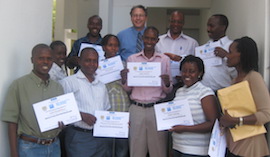Adapting U.S. Business Curriculum for New Audiences
Wednesday, August 3, 2016
It took an old folk story for Matt Brown, a faculty affiliate with WDI’s Education Initiative, to break through to his students — 30 female entrepreneurs from Rwanda — on how to write a business plan.

Brown, as part of a 10,000 Women entrepreneurship program sponsored by Goldman Sachs and organized by WDI in Rwanda, was talking to the women about creating an “elevator pitch,” a common Western practice that helps entrepreneurs condense their business mission to the duration of an elevator ride. But as Brown soon found out, sharing details of one’s business with others is taboo in Rwanda.
Instead, Brown knew the women responded well to story examples so he began talking about “Stone Soup,” the folk story in which villagers combine their simple resources and end up creating a wonderful, rich soup. Brown told the women that the tale represented their entrepreneurial spirit and telling their business story could be like making stone soup. They then broke into small groups and encouraged each other on how to better to describe their business and entrepreneurial journey.
Brown, a Management and Organization faculty member at UM’s Ross School of Business, recounts the “stone soup” anecdote in an article he recently wrote, “Teaching and Learning with Rwandan Women Entrepreneurs,” which details how he tailored U.S.-style business curriculum to fit the needs of the women. Read the paper here.
The paper “is the story of how my instructional approach developed during a four-year process, how my teaching practices further evolved, and how I have learned some important lessons to apply to my domestic teaching and learning,” Brown wrote.
Started in September 2008, the six-month entrepreneurship training program was designed for women across Rwanda interested in growing their small- or medium-sized business. Participants learned about marketing, strategy, accounting, financial management and loans, negotiations, and how to create a detailed business plan, among other modules. In all, 330 women completed the Rwanda program by the time it concluded in 2014.
Brown joined the program as a faculty affiliate in 2009 and taught the first module for each new cohort, which included an overview of the training objectives and the elements of a business plan. He also would gauge the instructional needs of the women and pass that information along to instructors, who would teach future modules.
In the paper, Brown outlines the changes and adaptations he made so the lessons were relatable and understandable to the women. For example, a conventional U.S. business plan template includes topics such as executive summary, competitive advantage, and exit strategy. For the Rwanda program, those were changed to “How do you describe your business,” “What do you really need to grow?,” and “Why do you stay in this business?,” respectively.
Also, some business terms were not easily translatable from English to the women’s native language, Kinyarwanda.
“We paid careful attention to how to better address cultural interpretations of common business concepts and variations of understanding with respect to basic business plan elements,” Brown wrote. “Many of the technical business terms were wholly unfamiliar and unclear to the Rwandan businesswomen.”
Despite the challenges, Brown said his time working with the women was “one of the best experiences of my teaching career.” He made 11 visits to the country over a three-year period.
He marveled how well the women collaborated during exercises, how they wanted to succeed not so much for the money but instead as a way to serve their community. He also loved their “joy of spirit,” shown daily by their singing, clapping and dancing during breaks. Brown would often join in and felt “invigorated” for the next class session.
At the end of his article, Brown recounts watching one of the cohorts graduate while seated next to Rwanda’s First Lady Jeannette Nyiramongi Kagame, wife of Rwanda President Paul Kagame. During the ceremony, the women began singing, causing Kagame to tell Brown “they are singing for you.” While singing, the women waved to Brown and yelled out “stone soup.”
“I was practically reduced to tears and in the moment all I could do is touch my heart with my hand,” he wrote. “I felt so truly grateful to them; they were so full of joy. Where I saw business challenges, complex problems to solve, and lessons to convey, they saw joy and laughter and the power and impact of their new learning. The Rwandan women taught me lessons that I keep in my heart forever because they rekindled the entrepreneurial spirit within me as well.”
